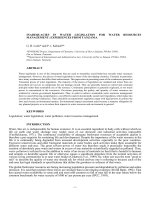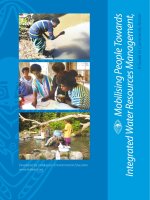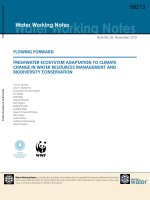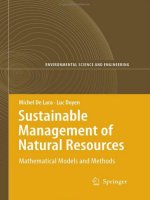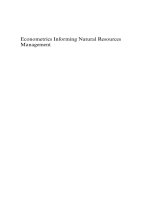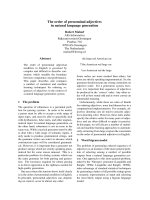Stakeholder Dialogues in Natural Resources Management doc
Bạn đang xem bản rút gọn của tài liệu. Xem và tải ngay bản đầy đủ của tài liệu tại đây (3.35 MB, 400 trang )
Environmental Science and Engineering
Subseries: Environmental Science
Series Editors: R. Allan • U. Förstner • W. Salomons
Susanne Stoll-Kleemann
Martin Welp (Eds.)
Stakeholder Dialogues
in Natural Resources
Management
Theory and Practice
With 20 Figures
EDITORS:
PD
DR. SUSANNE STOLL-
K
LEEMANN
H
UMBOLDT-UNIVERSITÄT ZU
BERLIN, DEPARTMENT OF
AGRICULTURAL ECONOMICS AND
SOCIAL SCIENCES, RESEARCH
GROUP GOBI,
L
UISENSTR. 53
10099
BERLIN, GERMANY
E-mail: susanne.stoll-kleemann@
agrar.hu-berlin.de
P
ROF. DR. MARTIN WELP
S
OCIOECONOMICS AND
COMMUNICATION
U
NIVERSITY OF APPLIED SCIENCES
E
BERSWALDE, FACULTY OF
FORESTRY
A
LFRED-MOELLER-STR. 1
16225
EBERSWALDE, GERMANY
E-mail: martin.welp@
fh-eberswalde.de
ISSN- 1863-5520
ISBN 10 3-540-36916-3 Springer Berlin Heidelberg New York
ISBN 13 978-3-540-36916-5 Springer Berlin Heidelberg New York
Library of Congress Control Number: 2006934202
This work is subject to copyright. All rights are reserved, whether the whole or part of the material is
concerned, specifically the rights of translation, reprinting, reuse of illustrations, recitation, broad-
casting, reproduction on microfilm or in any other way, and storage in data banks. Duplication of
this publication or parts thereof is permitted only under the provisions of the German Copyright Law
of September 9, 1965, in its current version, and permission for use must always be obtained from
Springer-Verlag. Violations are liable to prosecution under the German Copyright Law.
Springer is a part of Springer Science+Business Media
springeronline.com
© Springer-Verlag Berlin Heidelberg 2006
The use of general descriptive names, registered names, trademarks, etc. in this publication does not
imply, even in the absence of a specific statement, that such names are exempt from the relevant pro-
tective laws and regulations and therefore free for general use.
Cover design: E. Kirchner, Heidelberg
Production: A. Oelschläger
Typesetting: Camera-ready by the Editors
Printed on acid-free paper 30/2132/AO 543210
To Luisa and Elina
Contents
List of Figures XV
List of Tables XVII
List of Contributors XIX
Acknowledgements XXVIII
Part I Setting the Scene
Foreword:
Participatory Processes for Natural Resource Management 3
Ortwin Renn
Need for analytic-deliberative processes 3
The first element: The integration of science 4
The requirements for deliberative processes 6
Commitment matters 9
References 12
1 Towards a More Effective and Democratic Natural Resources
Management 17
Susanne Stoll-Kleemann, Martin Welp
1.1 Objectives and structure of the book 18
1.2 Context and definitions 21
1.3 Benefits of participation and stakeholder dialogues 27
1.4 Difficulties of participation and stakeholder dialogues 30
1.5 Lack and need of theory 33
References 34
VIII
Part II Theories and Tools
2 Integrative Theory of Reflexive Dialogues 43
Martin Welp, Susanne Stoll-Kleemann
2.1 The need for an integrative theory 43
2.2 The conceptualisation of the Integrative Theory of
Reflexive Dialogues 44
2.3 Social Psychological Theories 45
2.3.1 Impacts of group diversity and group processes on
stakeholder dialogues 45
2.3.2 Stereotyping as a limiting factor for group learning 48
2.3.3 The Theory of Psychological Reactance 50
2.4 Theories of Organisational Learning 51
2.5 Formal approaches 54
2.5.1 Are stakeholders rational actors? 54
2.5.2 Bayesian learning 56
2.5.3 Multi-criteria decision analysis 62
2.6 Other contributing theories 63
2.7 The Integrative Theory of Reflexive Dialogues 65
2.8 Conclusions 71
References 73
3 ‚Participation’ in Development Thinking – Coming to Grips
with a Truism and its Critiques 79
Uta Berghöfer, Augustin Berghöfer
3.1 Overview 79
3.2 Introduction: On doctors and patients 80
3.3 History: Changing paradigms in development thinking 81
3.4 Implementing participation: The promise of Participatory
Rural Appraisal (PRA) 86
3.5 Seeking clarity 88
3.5.1 Defining participation 88
3.5.2 Four axes of differentiation 90
3.6 The Pitfalls: Critiques of participation 96
3.6.1 Who participates? 96
3.6.2 Participation: in what dimension? 99
3.6.3 How does the process of participation take place? 101
Contents IX
3.6.4 What is the purpose of participation? 106
3.7 Conclusion: for a more precise approach to participation 109
References 112
4 Evaluating Stakeholder Dialogues 117
Angela Oels
4.1 The case for stakeholder dialogues 118
4.1.1 Defining stakeholder dialogues 118
4.1.2 Stakeholder dialogues for science 118
4.1.3 Stakeholder dialogues for policy-making 120
4.1.4 Stakeholder dialogues for management 121
4.1.5 Three types, many evaluation strategies 122
4.2 Evaluating stakeholder dialogue 123
4.2.1 Why and when to evaluate 123
4.2.2 Criteria for the evaluation 124
4.2.3 Process or outcome criteria 126
4.2.4 Outsider or participatory evaluation 126
4.2.5 Quantitative or qualitative methods 127
4.2.6 The use of evaluation findings 128
4.3 Criteria for the evaluation 128
4.3.1 Theory-based criteria 128
4.3.2 User-based criteria 133
4.4 Common findings of evaluations 139
4.4.1 Stakeholder dialogues for science 141
4.4.2 Stakeholder dialogues for policy-making 142
4.4.3 Stakeholder dialogues for management 143
4.4.4 Criteria for success 144
4.5 Conclusions 145
References 147
5 Tools for Stakeholder Assessment and Interaction 153
Jürgen Scheffran
5.1 Introduction 153
5.2 Stakeholder involvement in interactive decision-making 154
5.3 Tools in stakeholder interaction and modelling 157
X
5.3.1 The stakeholder concept in management and systems
science 157
5.3.2 Stakeholder modelling and simulation 158
5.4 Tools in environmental conflict resolution and mediation 162
5.5 Interactive methods for group decision and negotiation
support 165
5.5.1 Basic approaches 165
5.5.2 Internet tools for negotiation analysis 167
5.6 Agent-Based Modelling 169
5.6.1 Structure and behavior of agents 169
5.6.2 Simulation environments and environmental simulation 170
5.7 Stakeholders in Integrated Assessment 173
5.7.1 Participation and validation in Integrated Assessment
modelling 173
5.7.2 Examples of Integrated Assessment models 175
5.8 Integration and outlook 177
References 181
6 Geo-information Visualisation Tools to Facilitate Stakeholder
Dialogues in Land and Water Management Planning 187
Marleen Maarleveld, Rob van de Velde, Joost van Uum,
Irene Pleisier
6.1 The stakeholder dialogue context addressed 187
6.2 Theoretical perspectives for facilitating stakeholder
dialogues through geo-information visualisation tools 189
6.2.1 Planning as learning 189
6.2.2 Geo-information visualisation tools as a means to
facilitate stakeholder dialogues and decision-making 193
6.3 Geo-visualisation practice in the facilitation of stakeholder
dialogues and decision making in land and water
management planning 196
6.3.1 Realizing the problem: Joint learning for watershed
management in the Ifugao, Philippines 197
6.3.2 Exploring alternatives: Visualising consequences of
flood management choices in the EU 200
6.3.3 Experiencing the future: Flying through planned urban
expansion in Groningen, the Netherlands 203
6.4 Conclusion: Seeing is believing 206
References 209
Contents XI
Part III Case Studies in Environmental Policy,
Management and Science
7 Science-based Stakeholder Dialogues in Climate Change
Research 213
Martin Welp, Anne C. de la Vega-Leinert,
Susanne Stoll-Kleemann, Cornelia Fürstenau
7.1 Introduction 213
7.2 Stakeholder dialogues in climate change research 216
7.2.1 Experiences at PIK 216
7.2.2 European Climate Forum (ECF) 219
7.2.3 ATEAM 221
7.2.4 SilviStrat 224
7.3 Methods applied in the dialogues 225
7.4 Reflections 229
7.4.1 How can we evaluate science-based stakeholder
dialogues? 229
7.4.2 Achievements 230
7.4.3 Dealing with different expectations 233
7.5 Conclusions: dialogue practice in view of the Integrative
Theory of Reflexive Dialogues 235
References 238
8 Science in Support of the Forest Biodiversity Programme for
Southern Finland - Working from the inside 241
Eeva Hellström
8.1 Introduction 241
8.2 Traditions of forest protection in Finland 242
8.3 Scientific involvement in compiling the forest biodiversity
programme for Southern Finland 244
8.3.1 From “outside” involvement to “inside” involvement 244
8.3.2 Setting the stage for information-sharing and
trust-building 247
8.3.3 Conceptual work and process support 249
8.3.4 Strategies and outcomes 252
XII
8.4 Lessons learned 255
8.4.1 New perspectives on the utilization of science 255
8.4.2 Challenges in working from the “inside” 257
References 259
9 Public Participation during Site Selections for Natura 2000 in
Germany: The Bavarian Case 261
Melanie Eben
9.1 Introduction 261
9.2 Public participation – just a new buzz word? 261
9.3 The Biodiversity Strategy of the European Union: the
Natura 2000 network 262
9.4 Implementation procedures of Natura 2000 264
9.5 Opposition to protected areas in Bavaria 266
9.6 Reasons for opposition 267
9.7 The participatory process in Bavaria 269
9.8 Public participation – a success or failure? 271
9.9 What can we learn from the Bavarian case? 273
References 276
10 Experiences with Stakeholder Dialogues in Natural Resources
Management in Ecuador 279
Two Case Studies from German Development Cooperation
Projects 279
10.1 Participation in the Machalilla National Park, Ecuador 280
Michael Sturm, Jorge Samaniego Rivera
10.1.1 Introduction 280
10.1.2 The participatory approach of the German
Development Service…………………………………… 282
10.1.3 Participation in the Machalilla National Park (MNP),
Ecuador 283
10.1.4 Examples of participation in the MNP 288
10.1.5 Conclusions, transferability, and lessons learned 296
Contents XIII
10.2 Community Forest Management in Esmeraldas -
Is Constructive Dialogue Possible? 304
Jörg Linke
10.2.1 Introduction to a Community Forest Management
Project in Esmeraldas 304
10.2.2 What kind of problems and conflicts existed before
the stakeholder dialogue was established? 306
10.2.3 Who are the actors? 307
10.2.4 What have the objectives of the stakeholder dialogue
been? 310
10.2.5 Description of the communication tools 312
10.2.6 Outcome analysis 317
10.2.7 Lessons learned 319
References…………………………………………………321
11 Incorporating Local People through Economic Incentives at
Lake Mburo National Park, Uganda – Africa Works! 325
Christiane Averbeck
11.1 Non-participatory conservation history of
Lake Mburo National Park 325
11.2 Participatory conservation history of Lake Mburo
National Park 327
11.3 A new wildlife management policy towards participation
in Uganda 328
11.4 The Lake Mburo Wildlife Utilisation Study 329
11.5 Participatory aspects of the Lake Mburo Wildlife
Use Study 329
11.5.1 Planning 330
11.5.2 Introduction 330
11.5.3 Wildlife research 331
11.5.4 Focus group interviews 331
11.5.5 Collecting legends, phrases and sayings 332
11.5.6 Feedback to interviews 332
11.5.7 Impala cropping 332
11.5.8 Presentation of study results 334
11.6 Lessons learnt on participation 337
11.7 Conclusion 340
11.8 Summary 341
Acknowledgements 341
References 342
XIV
Part IV Perspectives
12 Linking Case Studies to the Integrative Theory of
Reflexive Dialogues 347
Susanne Stoll-Kleemann, Martin Welp
12.1 Case studies in view of the Integrative Theory of
Reflexive Dialogues 347
12.1.1 Actors: who were the stakeholders? 348
12.1.2 Structures 351
12.1.3 Processes 355
12.1.4 Methods 358
12.1.5 Outcomes 359
12.2 Analysis of the case studies using the book’s other
theoretical approaches 363
12.2.1 Participation and development 363
12.2.2 Stakeholder dialogues and tool development 366
12.3 Conclusions 368
References 370
Epilogue: Spreading the Ripples 373
Tim O´Riordan
Index 377
List of Figures
Figure 2.1 A simple Bayesian belief network 60
Figure 2.2 Elements of the Integrative Theory of
Reflexive Dialogues 68
Figure 5.1 The stakeholder cycle and tools for stakeholder
assessment and management 179
Figure 6.1 Kolb’s learning cycle 190
Figure 6.2 Planning as learning 191
Figure 6.3 Single, double, and triple loop learning 192
Figure 6.4 Combining maps, aerial photos, and GIS 198
Figure 6.5 GIS-assisted learning in planning 199
Figure 6.6 Geo-information based visualisation of water
retention effects in Hurwenense Uiterwaard 202
Figure 6.7 Bird’s-eye view of the urban housing development
project Groningen Meerstad, the Netherlands 204
Figure 8.1 The process of compiling the Forest Biodiversity
Programme for Southern Finland 249
Figure 9.1 Map of all 16 German Bundesländer 265
Figure 10.1 Map of the south-western part of the Ecuadorian
coastal province Manabí 281
Figure 10.2 Tree nursery in Agua Blanca 289
Figure 10.3 Plantation of trees along the main street of
Puerto López 289
Figure 10.4 School in Soledad, a small village in the Machalilla
National Park 292
Figure 10.5 Environmental education in Casas Viejas 292
Figure 10.6 Tools for dialogues in MFC-E 316
Figure 12.1 Elements of the Integrative Theory of
Reflexive Dialogues 348
List of Tables
Table 2.1 Conditional probability table of an imaginary
stakeholder 60
Table 3.1 Basic questions: Axes of differentiation 90
Table 3.2 “Who participates?” 92
Table 3.3 “In what dimension?” 93
Table 3.4 “How does the process of participation take place?” 93
Table 3.5 “What is the purpose of participation?” 95
Table 4.1 Conditions for the fair and competent ideal speech
situation 129
Table 4.2 Three examples of criteria to test for the competence
of a discourse 130
Table 4.3 Stakeholders to the evaluation in Rushmoor Borough 134
Table 4.4 Evaluation criteria and data sources generated in a
stakeholder-based evaluation 135
Table 4.5 Comparative view of theory-based and
stakeholder-based criteria sets 139
Table 5.1 Agent-based models in environmental assessment 172
Table 7.1 Project description 218
Table 9.1 The percentages of designated national territory
under the Birds Directive and the Habitats
Directive 271
Table 10.1 History of conflicts and participation in the
Machalilla National Park 298
Table 11.1 Participatory aspects of the Lake Mburo Wildlife
Use Study and Pilot Project 333
List of Contributors
Dr. Christiane Averbeck is executive director of Transfer-21, a
Germany-wide program on education for sustainable development. She has
worked as a consultant for the German Council for Sustainable
Development, conducted a research project on sustainable resource use in
Uganda, worked as a senior advisor for a German NGO in Uganda, and as
senior researcher in a project funded by the Federal Environmental Agency
on marine pollution. She holds a Master’s degree in biology and a Ph.D. in
natural science.
Augustin Berghöfer works for the Omora Foundation in the recently
established Cape Horn Biosphere Reserve, coordinating the outreach
activities of this small Chilean NGO dedicated to bio-cultural research and
conservation. With a background in economics and political science, he
has been studying the obstacles to participatory endeavours in post-conflict
development assistance. As member of Susanne Stoll-Kleemann's research
group on biodiversity governance, he investigated experiences of
participation in protected area management.
Uta Berghöfer works at the UFZ Centre for Environmental Research in
Leipzig. Trained in geography, she is currently completing her Ph.D.,
exploring the diverse ways that humans relate to nature and the
significance of these relationships for biodiversity conservation. As a
member of BIOKONCHIL - a German-Chilean research project studying
possibilities for implementing the Ecosystem Approach of the Convention
on Biological Diversity - she has been conducting qualitative social
research in southern Chile since 1998. In this context she has accompanied
the initiative to establish the Cape Horn Biosphere Reserve, advising in the
design and organisation of the participatory processes and the associated
local information campaign.
Melanie Eben studied ecology at the University of East Anglia (UK)
and obtained a Master´s degree in conservation from University College
London. Her interest in conservation, environmental education, monitoring
systems, and participatory methods and instruments has led her to
undertake research in various Latin American countries. She is currently
living in Ecuador, where she is working as a freelance consultant.
XX
Cornelia Fürstenau is a junior research scientist at the Potsdam
Institute for Climate Impact Research (Department of Global Change and
Natural Systems). She has a university degree (Diploma) in forest science.
Her research focuses on the impact of forest management and climate
change on different forest functions such as carbon sequestration, ground
water recharge, income from timber production, and biodiversity in
temperate forest ecosystems. In a science-based stakeholder dialogue, she
has looked into the interests of forest user groups in the management of
forest ecosystems, their goods and services, and their awareness of the
future impacts of climate change on forest ecosystems.
Dr. Eeva Hellström is director of the Forest Academy for Decision-
Makers, which is a discussion forum on forest issues directed at top-level
decision makers throughout Finnish society. It is organised by the Finnish
Forest Association, which is a co-operation and communication body that
links the Finnish forest sector and related fields. She has also held
numerous positions of trust related to forest policy, natural resource
businesses, professional unions, rural employment, and forest science. For
example, Eeva was a member of the steering group of Finland's National
Forest Program during its formative period (1998-99). As a member of the
Committee for Forest Protection in Southern Finland (2000-02), she
chaired a working group assigned to develop new policy means of forest
protection.
Dr. Jörg Linke is working for the German technical cooperation agency
GTZ, where he is currently serving as an advisor in the Tunisian Ministry
of Environment. In this role he coordinates two projects: i) Implementation
of the United Nations Convention on Combat of Desertification
(UNCCD), ii) Implementation of the UN Framework Convention on
Climate Change (UNFCCC). Before this, he was coordinator of the GTZ
programme component: "Sustainable management of forests, protected
areas and forestry politics" in the Ministry of Environment of Ecuador. He
has a Master’s Degree in Forestry Science in the temperate zones and a
Master’s Degree in Forestry in the tropics and subtropics, as well as a
Ph.D. in Forestry. Jörg also has gained broad knowledge working with
pluralistic stakeholder forums (including indigenous communities and the
private sector) and from experience in the conceptualisation and
implementation of financing instruments for environmental management
and protection, including payment systems for environmental services.
List of Contributors XXI
Dr. Marleen Maarleveld studied social and organizational psychology
at Leyden University, the Netherlands. She worked as a researcher at the
Department of Communication and Innovation Studies, Wageningen
University and Research. In addition to her Ph.D. research on social-
environmental learning for sustainable natural research management, she
has facilitated participatory projects in water management and
management of change. She worked as a knowledge and innovation
manager in the field of planning and governance and as a program
manager leading an organizational development program that aimed to
improve the "customer-orientation" of the organization. Currently she is
working as a consultant in the field of water management and spatial
development for Arcadis, an engineering and consultancy firm.
Dr. Angela Oels is Assistant Professor in International Relations at the
Institute of Political Science at the University of Hamburg. She teaches the
politics of international trade, environmental politics, globalisation/global
governance and political theory. Dr. Oels was trained in environmental
engineering and has a Ph.D. in environmental sciences. Her Ph.D. was
published by LIT-Verlag under the title 'Evaluating Stakeholder
Participation in the Transition to Sustainable Development: methodology,
case studies, and policy implications'. She is currently working on a book
project toward her German post-doctoral Habilitation degree that draws on
Foucault's concept of governmentality to discuss current changes in the
role and power of the state in multi-level, multi-actor governance. For a
detailed CV see www.angelaoels.de.
Prof. Dr. Tim O’Riordan is Professor of Environmental Sciences at the
University of East Anglia and closely associated with the Tyndall Centre
for Climate Change Research, the Leverhulme Programme on
Understanding Risk, and the Centre for Social and Economic Research on
the Global Environment. Tim began his studies in geography at the
Edinburgh University, in his home City of Edinburgh, and received his
Ph.D. in Geography at Cambridge University. After a spell of teaching
geography at Simon Fraser University, Vancouver, British Columbia,
Canada, he took up a visiting lectureship in geography at the University of
Canterbury in 1971. Returning to East Anglia in 1974, he embarked on a
course in conventional politics and wrote a book on the meaning and role
of environmentalism. This was the beginning of a series of publications on
environmental politics and law, citizen science, the precautionary
principle, and the tortuous transition to sustainable development. His
research spans countryside management, biodiversity politics, risk and
nuclear power, community involvement in sustainable futures, and the
XXII
deeper politics of sustainability in the contemporary age. Tim is a member
of the UK Sustainable Development Commission and an academic advisor
to a number of integrated scientific bodies. He also works with business on
the transition to sustainability.
Irene Pleizier studied earth sciences at the Vrije Universiteit
Amsterdam. At the end of her studies, she undertook an internship at the
company Geodan, working on 3D visualisation and 3D GIS. After
finishing her studies, she started working both for Spinlab as a researcher
on 3D visualisation and for the research and development department of
Geodan. Her main focuses at Geodan are 3D visualisation of large spatial
areas and GIS for Secondary education. At the Vrije Universiteit, Irene is
currently working on her Ph.D. on the influence of GIS on the increase of
knowledge of secondary school geography students. This is being done
within the EduGIS project (www.edugis.nl).
Prof. Dr. Ortwin Renn serves as full professor and chair of
environmental sociology at Stuttgart University. He directs the
Interdisciplinary Research Unit for Risk Governance and Sustainable
Technology Development (ZIRN) at the University of Stuttgart and the
non-profit company DIALOGIK, a research institute for the investigation
of communication and participation processes in environmental policy
making. Ortwin Renn has a doctoral degree in sociology and social
psychology from the University of Cologne. He is a member of the panel
on “Public Participation in Environmental Assessment and Decision
Making” of the U.S. National Academy of Sciences in Washington, D.C.,
a member of the Berlin-Brandenburg Academy of Sciences, the German
Academy for Technology and Engineering, and the European Academy of
Science and Arts (Vienna and Salzburg). His honours include the
“Distinguished Achievement Award” of the Society for Risk Analysis
(SRA) and the Outstanding Publication Award from the Environment and
Technology Section of the American Sociological Association for the book
“Risk, Uncertainty and Rational Action“ co-authored with C. Jaeger, G.
Rosa und Th. Webler. Among his political activities is the chairmanship of
the State Commission for Sustainable Development (German State of
Baden-Württemberg). Renn is primarily interested in risk governance,
political participation, and technology assessment. He has published more
than 30 books and 200 articles.
List of Contributors XXIII
Jorge Samaniego Rivera is a marine biologist. He has worked in
environmental education as a staff member of the Machalilla National Park
and the local authority of Puerto López, Ecuador. In this function he has
worked as a counterpart of the German Development Service DED. He is
currently an advisor in the Corpocación de Manejo Forestal Sustentable
(COMAFORS) in the province of Manabí, Ecuador.
Prof. Dr. Jürgen Scheffran is a senior research scientist with ACDIS at
the University of Illinois at Urbana-Champaign, and has adjunct faculty
positions at the Departments of Political Science and Atmospheric
Sciences. After his Ph.D. in Physics at the University of Marburg in
Germany, he worked as a researcher and assistant professor in the
interdisciplinary research group IANUS and the mathematics department
at the Technical University of Darmstadt. After a research project at
Hamburg University, he joined the Potsdam Institute for Climate Impact
Research in 2001, and in 2003 he was temporary Visiting Professor at the
University of Paris (Pantheon/Sorbonne). His research and teaching
interests include energy, environment and climate change; complex
systems analysis and computer modeling; technology assessment, arms
control and international security. Currently he is coordinating a research
project on renewable energy and land use.
PD Dr. Susanne Stoll-Kleemann is an Associate Professor at the
Humboldt University of Berlin and is trained in geography and social
sciences. She leads the Research Group GoBi (Assessing Biodiversity
Governance and Management Approaches). In this research project,
together with her five Ph.D. and six Master’s students, she investigates
success and failure factors of protected area management and governance.
Before this recent appointment, she was a senior researcher at the Potsdam
Institute for Climate Impact Research (Department of Global Change and
Social Systems). Susanne is an interdisciplinary social scientist focusing
on human-environment relations, especially stakeholder dialogues. Her
research interests are in the human dimensions of global environmental
change and sustainability science. Susanne is the Vice-President of the
German Society of Human Ecology.
Dr. Michael Sturm started his doctor's degree in Geography at the
Technical University of Berlin on sustainable land-use in Monteverde,
Costa Rica, finishing it at the Institute for Geography at the Humboldt
University Berlin in 1995. He has worked as a National Park Manager for
the German Development Service DED in the Machalilla National Park,
Ecuador (1995 - 1997) and as a Project Manager of EXPO 2000, a world
XXIV
exhibition project in north Germany, on Implementing Low and
Renewable Energy Concepts (1999 - 2001). From the end of 2001 until the
end of 2004 he worked as co-ordinator in a project in Flensburg, Germany
on strategies of energy reduction in schools (based on the Eco
Management and Audit Scheme EMAS). Currently he leads his own data
management company, “Agentur Sturm“, in Flensburg. He plans and
realizes projects with environmental and infrastructural subject matters,
among other things for people with activity limitations.
Joost van Uum graduated with a Master of Science degree in Tropical
Civil Engineering and Water Management from the Wageningen
University and Research Centre, the Netherlands. As a geo-adviser he has
coordinated GIS projects at several governmental institutes. His expertise
is in programming, implementing, and the use of GIS. As a teacher at
Bureau Nieuwland, he coordinated educational GIS programs and gave
GIS courses to civil engineering companies and government organizations.
He is currently working at the Government Service for Land and Water
Management as geo-adviser and program manager to coordinate the
development of new initiatives in GIS.
Dr. Anne Cristina de la Vega-Leinert is an independent researcher on
societal perception of climate change, environmental conflicts, the
communication of scientific knowledge, social learning, and participatory
research. She has an M.Sc. in Quaternary Sedimentology and
Geomorphology (University College Dublin) and a Ph.D. in Holocene
Coastal Environmental changes (Coventry University). At the Flood
Hazard Research Center (London), her research focused on the impacts of
accelerated sea-level rise and integrated coastal zone management. At the
Potsdam Institute for Climate Impact Research (Germany), she worked as
a scientific and stakeholder dialogue coordinator within the DINAS-
COAST ( and the ATEAM projects
( She is currently working in the GoBi
project ( assessing success and
failure factors in management of tropical biosphere reserves.
Rob van de Velde studied human geography at the Vrije Universiteit
Amsterdam. He has worked as GIS-program manager at the National
Physical Planning Agency and the National Institute of Public Health and
Environment. He has undertaken applied research on various geo-
information issues, such as spatial decision support systems,
environmental assessments, and land-use policy scenarios. Currently, he
leads the GIS Competence Centre at the Government Service for Land and
List of Contributors XXV
Water Management, an executive body of the Ministry of Agriculture,
Nature and Food Quality. Since May 2003 he has been part of the Spinlab
team of the Vrije Universiteit Amsterdam, where he focuses on research
about spatial virtual environments and decision making.
Prof. Dr. Martin Welp serves as professor at the University of Applied
Sciences Eberswalde (near Berlin) at the Faculty of Forestry. Before this
recent appointment, he was a senior researcher at the Potsdam Institute for
Climate Impact Research (Department of Global Change and Social
Systems). He holds a Master’s Degree in Forestry and a Ph.D. Degree in
Agriculture. Martin has researched public participation and stakeholder
dialogues in various fields of environmental management, including forest
management, coastal management, river basin management, and protected
area management. His current research activities focus on linking
stakeholder involvement and computer-based modelling in global-change
mitigation and adaptation. The European Climate Forum (ECF), which
engages researchers, companies, NGOs and other actors in science-based
stakeholder dialogues, provides a context and basis for his research on the
practice and theory of dialogues.
Acknowledgements
The idea for this book was born after an ambitious workshop organized by
the Centre for Environmental Research (UFZ) Halle-Leipzig. The session
focussed on participatory methods and multicriteria analysis. During a
discussion on the way back home, we concurred that the present literature
on natural resources management does not adequately connect
participatory approaches with some theories and new tools that in our view
are highly relevant. This relates in particular to the new field of
stakeholder dialogues and its theoretical underpinning.
Fortunately we were able to convince a few of our colleagues, some of
whom were practitioners and some academics, to reflect on the art and
practice of stakeholder dialogues. We thank all the authors of the present
volume for sharing their specific knowledge, insights, and experiences in
the articles. In particular, we are grateful to Prof. Ortwin Renn and Prof.
Tim O’Riordan for their valuable observations in the introduction and
epilogue.
The stakeholder task force at our former affiliation, the Potsdam
Institute for Climate Impact Research, Department of Global Change and
Social Systems, provided a valuable platform for new ideas. We would
like to thank Prof. Carlo C. Jaeger (Head of Department), Dr. Anne C. de
la Vega Leinert, and Antonella Battaglini for many intellectually
challenging discussions. Exchanges with many other colleagues in
Germany and abroad are also deeply appreciated, in particular those with
Dr. Fritz Reusswig, Dr. Hermann Lotze-Campen, Dr. Jürgen Kropp, Prof.
Bernhard Glaeser, Prof. Ludwig Ellenberg, Prof. Konrad Ott, Prof. Lenelis
Kruse-Graumann, Dr. Marc Hockings, Dr. Irene Ring, Dr. Frank Wätzold,
Prof. Uwe Jens Nagel, Prof. Eckart Ehlers, Prof. Craig ZumBrunnen,
Monika Bertzky, and Prof. Klaus Hasselmann.
The European Climate Forum provided a platform for dialogue and the
interchange of ideas with stakeholders representing companies, NGOs, and
policymakers. The German Society for Human Ecology was a valuable
academic forum that gave us opportunities to discuss matters dealt with in
this book with other colleagues.
We are grateful to the Robert Bosch Stiftung for supporting the
production of our work. Marion Mehring did a marvellous job of editing
and proofreading the chapters, and we thank Joe Greenman for reviewing
the linguistic content of the working draft. The responsibility for the final
version lies solely with us.
XXVIII
Finally, we are extremely thankful for the support and patience of our
respective partners, Heinz Kleemann and Esther Hoffmann, during the
writing and editing process (in particular on weekends). The book is
dedicated to our daughters, Luisa and Elina. Both were born in the midst of
the genesis of the book.
Susanne Stoll-Kleemann Martin Welp
Part I
Setting the Scene
